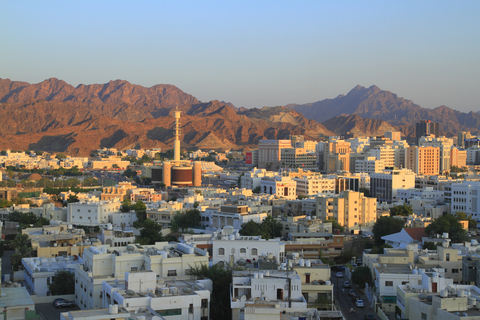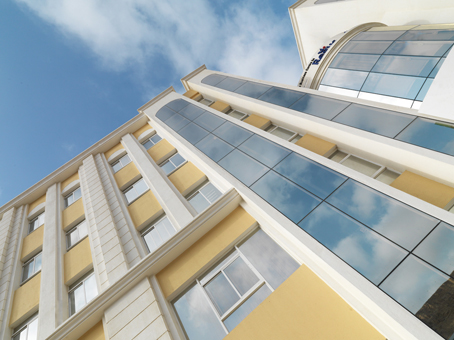
[Updated Oct 2020] A guide to serviced offices and office space for rent in Muscat as well as general information that may be useful if you are considering renting office space in the city.
For further Muscat offices information or to search office space to rent in Muscat just click. Or contact us for any office space query.
History & Geography
The capital of Oman is flanked to the north and west by the deep waters of the Gulf of Oman and to the east by the plains of Al Batinah. Muscat is also in close proximity to the Al Hajar Mountains, which run along the coastline of the country. The landscape surrounding the city is rocky and mountainous with scant vegetation. Muscat is an ancient city, first mentioned by Ptolemy in the 1st century CE, who referenced it as an important port. In the 3rd century, Muscat fell to the Sassanids, a late incarnation of the Persian Empire, but continued in its role as a regional trading hub. Over the ensuing centuries the city changed several times between different tribes and factions, but grew ever more important and powerful. In 1507 the Portuguese captured and pillaged the city, and Muscat remained under Portuguese rule for over a century. In 1650 the Portuguese were expelled and the Al Bu Sa’id dynasty came to power, and have remained Oman’s rulers since. Muscat continued to grow and cemented its role as the premier trading centre and port of the region. In the 19th century Said bin Sultan, then ruler of Muscat, signed a treaty with US President Andrew Jackson, confirming the city a the premier naval power in the region. During the early 20th century Muscat was twice attacked by tribes from the interior, but both times the British brokered a ceasefire. In 1970 Qaboos bin Said staged a bloodless coup against his father, Said bin Taimur. Then, with British assistance, he put down a rebellion in the Dhofar region of the country. Under Qaboos Muscat and Oman were both developed substantially. Infrastructure was extended and a new international airport was built in the Seeb district of Muscat. Today the city is one of the most modern in the region, with a dynamic economy and modern infrastructure.
Economy
Historically Muscat’s economy has always been based on trade, and that remains true to this day. Oman exports a number of materials and goods, including dates, fish, and mother of pearl. A bulwark of the economy is Petroleum Development Oman (PDO), which is currently the second-largest employer in the country. PDO exports approximately 720,000 barrels per day and its major shareholders include Dutch Shell. Most Omani trading companies are based in Muscat, the largest being Suhail Bahwan Group. It’s trading partners include Subaru, Toshiba, General Motors, RAK Ceramics and Hewlett Packard. The main stock exchange in the country, the Muscat Securities Market, is also located in the city. Due to Oman’s geographical position, Muscat’s port is the main hub between the Persian Gulf and India and the Far East. Approximately 1.6 million tones go through the harbour every year. Recently however the Jebel Ali Free Zone established in Dubai has come to challenge Muscat for the mantle of the premier trading hub in the region. Expatriates make up about 60 percent of the workforce in Muscat, with many working in the engineering sector.
Culture & Tourism
Oman doesn’t have the tourism industry that it’s neighbour Dubai has, but it’s a wonderful destination in its own right for tourists and visitors. Muscat itself has a number of buildings and sites of interest. Foremost among these is Sultan Qaboos Grand Mosque, built in 2001. Its a grand edifice, built from 300,000 tonnes of Indian sandstone and has a central dome rising 50 metres from ground level. The city also boasts a number of museums, the premier of which is the Museum of Omani Heritage. There is also the Omani’s Children’s Museum, the National Museum of Oman, the Omani Oil & Gas Exhibition Centre, and the Sultan’s Armed Forces Museum. The latest cultural project finished in 2011 was the Royal Opera House, situated in Muscat’s Shati Al-Qurm district. Muscat also has a retail industry large enough to satisfy any shopper. The main shopping area in the city is the Al Qurum Commercial Area. The Old Palace and Old Muscat are also popular destinations for visitors. Muscat has several five-star hotels, many of which are situated along the coast and have miles of pristine sandy beaches. Premier among these is the Al Bustan Palace Hotel.
Transport
Muscat is served by Muscat International Airport which is about 16 miles from the centre of Muscat itself. The airport has many international and domestic connections and is the headquarters of Oman Air, the country’s national airline. Muscat itself has no metro or subway, but it does have a comprehensive bus system. Many residents travel by the local buses which are inexpensive and efficient. The city is also served by a large taxi fleet. Fares are set by negotiation rather than a meter. Oman itself has a sizable network of highways providing access to all cities and towns in the country.

Occupancy rates in Muscat declined substantially from 2008 and have yet to recover. However, of late the government has opened access to more foreign investment and there have been a number of new projects created. The lack of a comprehensive public transportation system in Muscat means that the issues of congestion and overcrowding remain. The lack of proper parking facilities is also a major issue in the city. Many companies are choosing to construct their own office space away from the traditional office areas like the central business district and the more expensive Al Khuwair area, which has proximity to government offices.
Our office space search, advisory and acquisition services are FREE, always. We are globally regulated by the Royal Institution of Chartered Surveyors (RICS) ensuring the highest standards of commercial property advice and service at all times.
